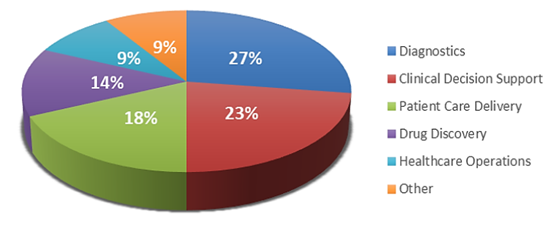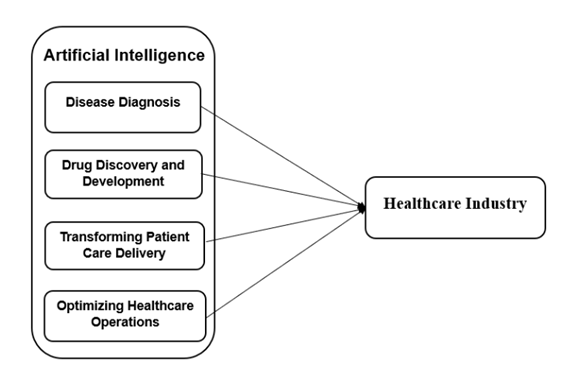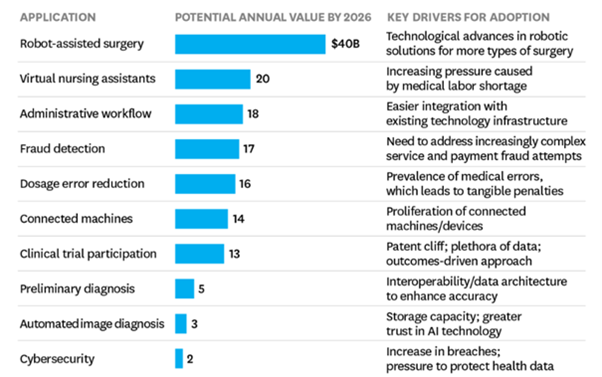AI in Healthcare - Part 2: Transforming Healthcare with Artificial Intelligence
June 17, 2024 | 5 minute read
The integration of artificial intelligence (AI) in healthcare is revolutionizing the industry. AI technologies are enhancing patient care, optimizing operations, and advancing medical research.
How is AI shaping the future of healthcare, and what implications does it hold for providers and patients alike?
Introduction
The healthcare industry is rapidly transforming due to advancements in Artificial Intelligence (AI). AI is revolutionizing disease diagnosis, personalized treatment plans, and overall patient care. By leveraging machine learning algorithms, AI enhances diagnostic accuracy, accelerates drug discovery, and optimizes resource allocation. This profound shift is streamlining healthcare delivery, enabling earlier disease detection, and improving patient outcomes. This article delves into the critical role of AI in medicine, highlighting its potential to significantly enhance clinical decision-making and revolutionize healthcare practices.

Source: The Strategists Network
Enhancing Patient Care
AI-driven tools significantly improving diagnostic accuracy. Machine learning algorithms can analyze medical images, such as X-rays and MRIs, to detect abnormalities with a high degree of precision. For instance, AI systems can identify early signs of diseases like cancer, enabling timely intervention and better patient outcomes.

Source: Researchgate
Applications of AI in Healthcare
| Application Area | Examples | Benefits |
|---|---|---|
| Diagnostics | Image analysis, predictive analytics | Improved accuracy, early detection |
| Patient Management | Virtual assistants, health monitoring | 24/7 support, reduced burden on professionals |
| Operations | Scheduling, billing, patient admissions | Cost reduction, minimized errors |
| Research | Genomics, drug discovery | Accelerated research, personalized medicine |
Additionally, AI-powered virtual assistants provide patients with 24/7 support. These digital health assistants can answer medical queries, remind patients to take medications, and monitor chronic conditions, thus reducing the burden on healthcare professionals.

Source: Accenture
Optimizing Operations
Operational efficiency in hospitals and clinics is critical. AI applications are streamlining administrative processes by automating tasks such as scheduling, billing, and patient admissions. This not only reduces administrative costs but also minimizes errors.
Predictive analytics, another AI application, forecasts patient admission rates and optimizes resource allocation. For example, hospitals can predict peak times for emergency room visits and ensure adequate staffing, thereby improving patient care during high-demand periods.
Operational Efficiency Gains with AI
| Task | Traditional Methods | AI-Enhanced Methods | Efficiency Improvement |
|---|---|---|---|
| Scheduling | Manual entry | Automated algorithms | Reduced time and errors |
| Billing | Manual processing | Automated billing systems | Faster processing, fewer errors |
| Patient Admissions | Paperwork | Digital check-in and data management | Streamlined process, reduced waiting time |
Advancing Medical Research
AI accelerates the pace of medical research. By analyzing vast datasets, AI can identify patterns and correlations that might be overlooked by human researchers. This capability is particularly valuable in genomics and drug discovery. AI algorithms can sift through genetic data to identify mutations linked to specific diseases, paving the way for personalized medicine.
Advancements in Medical Research with AI
Drug DiscoveryPredictive modeling of drug interactionsFaster development of effective treatmentsClinical TrialsPatient selection and monitoringMore precise and efficient trials
| Research Area | AI Application | Impact |
|---|---|---|
| Genomics | Pattern recognition in genetic data | Identification of disease-linked mutations |
Moreover, AI-driven simulations allow researchers to model the effects of new drugs and treatment protocols, speeding up the development of effective therapies.
Ethical and Practical Considerations
While AI offers numerous benefits, it also raises ethical and practical concerns. Data privacy is paramount, as AI systems require access to vast amounts of personal health data. Ensuring robust cybersecurity measures and compliance with regulations like HIPAA is essential.
Furthermore, the deployment of AI in healthcare must be equitable. There's a risk that AI tools may inadvertently perpetuate existing biases in healthcare delivery. Addressing these biases through inclusive data and careful algorithm design is crucial to achieving fair outcomes for all patients.
Conclusion
The integration of AI in healthcare is a game-changer, offering enhanced patient care, operational efficiencies, and groundbreaking medical research. As the technology evolves, addressing ethical considerations and ensuring equitable access will be key to harnessing its full potential.

Counting the Cost
The Financial Burden of Living with Chronic Conditions
May 16, 2023 | 3 minute read

3 ways to make filling a prescription easier
If you wish your pharmacy experience was a smoother and more pleasant one, here are a few ideas that can help
April 11, 2023 | 3 minute read

For the Love of Black History
Striving for a healthier future through accessibility
February 14, 2023 | 4 minute read

Falling out-of-network with your pharmacy
Why this happens and protecting your bottom line
December 13, 2022 | 5 minute read

Take control of your personal healthcare decisions
Options to consider for the new year
November 14, 2022 | 5 minute read

How parents can lighten the impact of the impending Adderall shortage
Tips from our DiRx Pharmacy Team
October 18, 2022 | 2 minute read

The HSA, HRA and FSA – understanding the difference
Are you taking full advantage of your benefit?
October 03, 2022 | 2 minute read

A pharmacist's perspective on the challenges patients are facing today.
An interview with Rima Arora, PharmD, RPh, Director of Pharmacy at DiRx
August 24, 2022 | 4 minute read

What can we do about the soaring cost of prescription medicine?
An interview with Satish Srinivasan, DiRx Founder and Chief Executive Officer
July 22, 2022 | 6 minute read

Is a prostate cancer screening right for you?
Learning more about prostate cancer screening risks and benefits can help you decide if it's right for you
June 8, 2022 | 4 minute read

How Safe is your prescription information online
Your prescriptions are part of your protected health information. Understand how it is used, shared and protected
May 25, 2022 | 3 minute read

Choosing an online pharmacy you can trust
Not all pharmacies are the same. Choosing one that you can depend on with your medicines and your health are important
April 13, 2022 | 3 minute read

5 reasons that choosing an online pharmacy may be right for you
Lots of people are discovering the benefits of choosing an online pharmacy for their prescription drug needs
March 30, 2022 | 3 minute read

Should you consider switching from brand-name to generics?
Being an informed healthcare consumer includes doing your homework when it comes to making decisions
March 16, 2022 | 3 minute read

Men's Health Matters! Age-Wise Checkups & Screenings You Need
Taking charge of your health is an empowering journey, and preventive care is the cornerstone.
June 10, 2024 | 10 minute read

AI in Healthcare - Part 1: The Future of Medical Diagnosis & Treatment
Imagine a world where robots perform surgery, AI diagnoses diseases with superhuman accuracy, and virtual assistants manage your medications.
June 3, 2024 | 5 minute read

Women’s Health FAQs Answered: A Comprehensive Guide
As a woman, taking care of your health should be a top priority, but it’s common to have questions and concerns. That’s why we’ve compiled this comprehensive blog to address some of the most frequently asked questions around women’s health
May 22, 2024 | 10 minute read

Understanding Euthyrox® (Levothyroxine): Your Comprehensive Guide to Thyroid Health
May 15, 2024 | 5 minute read

Prioritising Heart Health: A Vital Guide for Women in America
In the bustling rhythm of American life, women often prioritize everyone else’s health over their own. Yet, here’s a sobering fact: heart disease is the leading cause of death among American women, surpassing all types of cancer combined.
May 3, 2024 | 5 minute read

Your guide to Healthy Living:
Managing Diabetes
Whether you’ve recently been diagnosed or have been living with diabetes for years,
Feb 19, 2024 | 5 minute read

Understanding a Drug’s Journey to Generic Production
In today’s healthcare landscape, the rising costs of prescription medications have become a significant
July 18, 2023 | 3 minute read

Revolutionizing Women’s Healthcare: Empowering Women’s Health with DiRx
Here at DiRx Health, we’re on a mission to empower women to take control of their health and well-being.
March 8, 2023 | 5 minute read

Five reasons every woman needs an annual visit with a primary care provider
May 10, 2022 | 3 minute read

Get relief from pollen allergies
Learn ways to help prevent pollen allergies and how to ease the symptoms
July 18, 2023 | 3 minute read

Introducing Kyzatrex: A safe, effective and painless option for Testosterone Replacement Therapy
Aug 14, 2023 | 4 minute read

Counting the Cost
The Financial Burden of Living with Chronic Conditions
May 16, 2023 | 3 minute read

3 ways to make filling a prescription easier
If you wish your pharmacy experience was a smoother and more pleasant one, here are a few ideas that can help
April 11, 2023 | 3 minute read

For the Love of Black History
Striving for a healthier future through accessibility
February 14, 2023 | 4 minute read

Falling out-of-network with your pharmacy
Why this happens and protecting your bottom line
December 13, 2022 | 5 minute read

Take control of your personal healthcare decisions
Options to consider for the new year
November 14, 2022 | 5 minute read

How parents can lighten the impact of the impending Adderall shortage
Tips from our DiRx Pharmacy Team
October 18, 2022 | 2 minute read

The HSA, HRA and FSA – understanding the difference
Are you taking full advantage of your benefit?
October 03, 2022 | 2 minute read

A pharmacist's perspective on the challenges patients are facing today.
An interview with Rima Arora, PharmD, RPh, Director of Pharmacy at DiRx
August 24, 2022 | 4 minute read

What can we do about the soaring cost of prescription medicine?
An interview with Satish Srinivasan, DiRx Founder and Chief Executive Officer
July 22, 2022 | 6 minute read

Is a prostate cancer screening right for you?
Learning more about prostate cancer screening risks and benefits can help you decide if it's right for you
June 8, 2022 | 4 minute read

How Safe is your prescription information online
Your prescriptions are part of your protected health information. Understand how it is used, shared and protected
May 25, 2022 | 3 minute read

Choosing an online pharmacy you can trust
Not all pharmacies are the same. Choosing one that you can depend on with your medicines and your health are important
April 13, 2022 | 3 minute read

5 reasons that choosing an online pharmacy may be right for you
Lots of people are discovering the benefits of choosing an online pharmacy for their prescription drug needs
March 30, 2022 | 3 minute read

Should you consider switching from brand-name to generics?
Being an informed healthcare consumer includes doing your homework when it comes to making decisions
March 16, 2022 | 3 minute read

Men's Health Matters! Age-Wise Checkups & Screenings You Need
Taking charge of your health is an empowering journey, and preventive care is the cornerstone.
June 10, 2024 | 10 minute read

AI in Healthcare - Part 1: The Future of Medical Diagnosis & Treatment
Imagine a world where robots perform surgery, AI diagnoses diseases with superhuman accuracy, and virtual assistants manage your medications.
June 3, 2024 | 5 minute read

Women’s Health FAQs Answered: A Comprehensive Guide
As a woman, taking care of your health should be a top priority, but it’s common to have questions and concerns. That’s why we’ve compiled this comprehensive blog to address some of the most frequently asked questions around women’s health
May 22, 2024 | 10 minute read

Understanding Euthyrox® (Levothyroxine): Your Comprehensive Guide to Thyroid Health
May 15, 2024 | 5 minute read

Prioritising Heart Health: A Vital Guide for Women in America
In the bustling rhythm of American life, women often prioritize everyone else’s health over their own. Yet, here’s a sobering fact: heart disease is the leading cause of death among American women, surpassing all types of cancer combined.
May 3, 2024 | 5 minute read

Your guide to Healthy Living:
Managing Diabetes
Whether you’ve recently been diagnosed or have been living with diabetes for years,
Feb 19, 2024 | 5 minute read

Understanding a Drug’s Journey to Generic Production
In today’s healthcare landscape, the rising costs of prescription medications have become a significant
July 18, 2023 | 3 minute read

Revolutionizing Women’s Healthcare: Empowering Women’s Health with DiRx
Here at DiRx Health, we’re on a mission to empower women to take control of their health and well-being.
March 8, 2023 | 5 minute read

Five reasons every woman needs an annual visit with a primary care provider
May 10, 2022 | 3 minute read

Get relief from pollen allergies
Learn ways to help prevent pollen allergies and how to ease the symptoms
July 18, 2023 | 3 minute read

Introducing Kyzatrex: A safe, effective and painless option for Testosterone Replacement Therapy
Aug 14, 2023 | 4 minute read

Counting the Cost
The Financial Burden of Living with Chronic Conditions
May 16, 2023 | 3 minute read

EUTHYROX®, a branded
Levothyroxine is also available.
Tap here to know more
Buying Kyzatrex for the first time?
Use code FREETRIAL to get a 1 month supply of Kyzatrex for FREE






